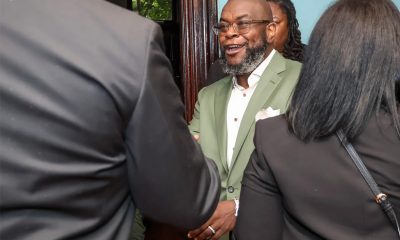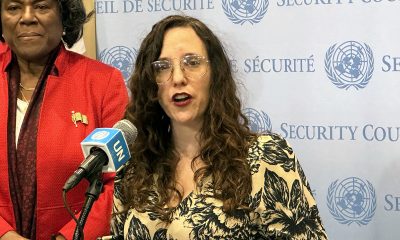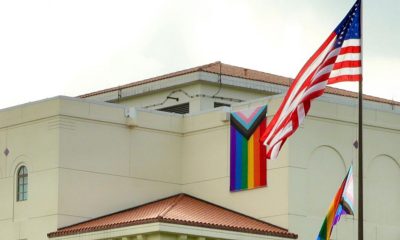Argentina
LGBTQ seniors in Argentina face uncertain future
President Javier Milei’s policies have disproportionately impacted retired pensioners

Editor’s note: International News Editor Michael K. Lavers will be on assignment in Argentina and Uruguay through April 12.
Argentina has undergone significant changes in its economic and social policies since President Javier Milei’s inauguration in December 2023. These changes have had a significant impact on various sectors of society, especially retirees and the LGBTQ community.
Mercedes Caracciolo, a 79-year-old sociologist and lesbian activist, shared her experience with the Washington Blade on how the new measures have affected her quality of life.
“Since Milei’s arrival in government, which began with a brutal devaluation, I am more careful in my spending than I was before,” she said.
Although Caracciolo has additional income from rental properties, she recognizes the situation is much more critical for those who exclusively depend on a pension.
With more than 7 million people receiving pensions, many find themselves “scratching the poverty line” due to the loss of purchasing power. The libertarian government’s economic policies have drastically affected their welfare, leading to a wave of protests across the country.
The reduction of social programs and the lack of LGBTQ-specific public policies have deepened the difficulties that seniors already face. The loss of economic stability particularly affects those who have historically lived on the margins, with fewer job opportunities and limited access to a decent retirement. Many older LGBTQ people, who have spent their lives unable to form traditional families, now find themselves without a support network and with an increasingly less present State.
The advance of conservative discourses has also generated a climate of insecurity and fear.
“There is no more sense of security and stability in old age,” Graciela Balestra, a psychologist who is the president of Puerta Abierta a la Diversidad, the first home for LGBTQ seniors in Argentina, explained. “Many LGBTQ+ retirees fear that there are fewer and fewer rights. They see what is happening in Argentina and globally with the advance of the right wing, and they feel that what they worked so hard to achieve is in jeopardy.”
In addition to economic difficulties, the LGBTQ community has faced additional challenges.
Caracciolo noted many supportive spaces have had their government subsidies reduced or eliminated, weakening community networks essential to the well-being of LGBTQ seniors.
“Community networks are also weakened because many of them require state support for certain types of expenses,” she noted.
Balestra warned about the psychological impact.
“Obviously it impacted mental health. There is much more anxiety, there is fear. People who say ‘I’m afraid they’ll kill me’ or ‘I’m afraid to show myself,'” she said. “Before, they used to walk down the street holding hands with their partner, and now they don’t do it anymore. A lot of hopelessness.”
For Balestra, the concern goes beyond the LGBTQ community.
“The economic issue, the rights issue, the fear that something similar to the dictatorship will return. All of this is very scary. And besides, the hopelessness of believing that this is going to continue, that it is not going to change even in the next elections,” she said.
Civil society organizations have denounced an “adjustment” in policies related to gender and diversity that Milei’s government has undertaken. Pride marches in Argentina have become a stage for protests against the president’s policies, especially over his speeches that activists consider hateful towards the LGBTQ community.
Balestra stresses the fear is not only individual, but collective.
“Human rights no longer exist anywhere, women no longer have the place they used to have, they are once again objectified, machismo is on the rise again,” she said. “This brings a lot of despair to older people.”
Despite the climate of uncertainty, Balestra emphasizes resistence forces are still in force.
“We continue working, as always,” she said. “For 25 years at Puerta Abierta we have been doing reflection groups, cultural workshops, social meetings, all with respect to being able to make LGBT people aware of their rights. We never stop meeting, but lately we are talking more and more about these things that we had already left a little behind. The issue of coming out, fear, visibility. Now we have to talk about it again.”
Argentina
Argentine president restricts transgender minors access to hormone treatments, surgeries
Advocacy groups say they could challenge Javier Milei’s decree in court

Argentine President Javier Milei on Feb. 5 issued a decree that restricts minors’ access to gender-affirming surgeries and hormone treatments.
Human rights organizations and LGBTQ groups have condemned the edict that modifies Argentina’s landmark Gender Identity Law.
The International Lesbian, Gay, Bisexual, Trans and Intersex Association for Latin America and the Caribbean (ILGALAC) and ILGA World have condemned the decree, noting it “imposes severe restrictions on the right to gender identity of trans and non-binary people, particularly young people.” They further state the restriction “ignores scientific evidence and the recommendations of international bodies, such as the World Health Organization (WHO) and the Inter-American Commission on Human Rights (IACHR).”
The Argentine Federation of Lesbians, Gays, Bisexuals and Trans (FALGBT), meanwhile, has announced it will go to court to stop the modification of the Gender Identity Law and, if necessary, will turn to international organizations. Legal experts have argued the decree is illegal and unconstitutional, and Argentina’s Supreme Court should intervene.
FALGBT President María Rachid, told the Washington Blade that “from the Argentine LGBT Federation we are filing a declaration of unconstitutionality for this DNU (the Spanish acronym for Necessary and Urgent Decree), because we consider that the president is begging for legislative powers that do not correspond to him. That law was approved by a wide majority in both chambers, where specialists of medicine, of law went to expose concrete research on these issues.”
“On the other hand, we are also going to file injunctions, both collective and individual, to defend the rights of trans children and adolescents, mainly,” said Rachid. “It is not true what he (Milei) says to justify this absolute intrusion to legislative powers, saying that 5-year-old children are mutilated. This is not true. Genital reassignment operations are performed after the age of 18, even by medical indication.”
This decree is in addition to other measures of Milei’s government that affect the LGBTQ community, such as the prohibition of gender-affirming treatments and surgeries for minors and limits on housing transgender women in female prisons.These actions have generated controversy and concern among human rights advocates and international organizations.
“President Javier Milei, since he took office, has been carrying out a series of measures that directly affect the vast majority of formal and informal workers in Argentina, and the LGBTIQNB population is no exception,” said Ornella Infante, a trans woman who is a national leader of the leftist Evita Movement. “In addition to the hate speeches that multiply violence; it is a class hatred to sectors with organizational and mobilization capacity such as women, unions, social movements, and sexual diversity.”
“It is exposed with the dismissals of LGBT people from national agencies, the definition of gender policies, the closure of INADI, a state agency that worked to eradicate discrimination in the country,” added Infante. “All of this directly affects vulnerable populations and painfully shows that it is part of their government’s ideals to end human rights policies.”
ILGA World has urged the international community, human rights organizations and democratic institutions to speak out against these measures and to demand the repeal of the decree, calling it “an abuse of executive power and a blow to democratic institutionality.”
Argentina
Millions march against Javier Milei in Argentina
Protests took place after president’s comments at World Economic Forum

Millions of people in Buenos Aires and across Argentina participated in marches against President Javier Milei in response to his controversial comments at the World Economic Forum in Davos, Switzerland.
The Buenos Aires march, led by LGBTQ, women’s and human rights organizations in Argentina, shaped up to be one of the largest demonstrations against Milei since he became president in December 2023. The mobilization is a direct response to Milei’s disparaging comments about feminism, LGBTQ rights, and other progressive movements.
Milei called “wokism” and “gender ideology” harmful during his Jan. 23 speech at the World Economic Forum, even comparing them to pedophilia. These statements sparked outrage across Argentina with protesters demanding the defense of human rights and equality.
María Rachid, president of the Argentine LGBT+ Federation, told the Washington Blade on Sunday “the march was massive, a strong message to President Milei putting a limit to hatred, discrimination and violence.”
“Argentine society built the values of respect for diversity, equality, and true freedom and yesterday it came out to defend them with massive demonstrations throughout the country and in many cities around the world,” said Rachid. “We are proud of what we were able to build because although they want to destroy it, it is already part of the heart of Argentine society.”
The Buenos Aires march began at the National Congress and ended at the Casa Rosada, the seat of the country’s presidency. Thousands of demonstrators, many with rainbow flags and banners that read “rights are not negotiable,” expressed their strong rejection of Milei’s policies.
Gay Congressman Esteban Paulón highlighted to the Blade “the call for the march was impressive.”
“I think it exceeded any forecast, not only because of the massiveness in the City of Buenos Aires, where it is estimated more than a million people, but also because of the massiveness in the 150 cities in which it was held throughout the country,” he said. “The truth is that it was a very, very big march in Rosario, in Córdoba, in Santa Fe, in Mar del Plata, in Bariloche, in the north, in Salta.”
“There was no expectation that it would be so, so massive, beyond the one in Buenos Aires, which had had an important call, an important visibility, which had added several actors,” added Paulón.

Sofía Díaz, a transgender woman who worked as a civil servant before Milei’s administration fired her, marched in Corrientes, a city in Chaco province.
“After President Milei’s speeches in Davos, the next day we started texting each other on WhatsApp,” she said, referring to public employees at the national level. “We were really afraid of what he had said.”
Activists around the world expressed solidarity with their Argentine counterparts.
Marches took place in cities around the world — including in Santiago, Chile; Montevideo, Uruguay; Rio de Janeiro; São Paulo; Mexico City; London; Madrid; Amsterdam; Berlin; Geneva; Paris; New York; Lisbon, Portugal; and the Spanish cities of Barcelona and Granada.
The Movement for Homosexual Integration and Liberation, a Chilean LGBTQ rights group, on Feb. 1 organized a march to the Argentine Embassy. Activists delivered a letter that expressed solidarity with the LGBTQ community and repudiated Milei’s policies against it.
Argentina
Gay Argentine congressman files criminal complaint against Javier Milei
President made anti-LGBTQ comments during World Economic Forum speech

Argentine President Javier Milei is facing a new controversy after he made a series of homophobic and transphobic comments at the World Economic Forum in Davos, Switzerland.
Congressman Esteban Paulón, a long-time LGBTQ rights activist, in a criminal complaint he filed argues the president used discourse that promotes negative stereotypes, and encourages violence against the LGBTQ community.
Milei in his Jan. 23 speech made statements that linked the LGBTQ community to pedophilia, specifically citing the case of a gay couple in Georgia sentenced to life in prison last year after they pleaded guilty to sexually abusing their two adopted children. Milei also claimed 5-year-old children undergo gender-affirming surgeries, an argument that experts have categorically denied.
These statements sparked national and international outrage.
“Milei radicalizes hate speech based on lies and fabricated truths,” said Paulón in an exclusive interview with the Washington Blade. “He raises harmful stereotypes against the LGBTQ+ community, which generates fear and anguish in our communities. We have filed a criminal complaint, understanding that his statements constitute several crimes aggravated by his presidential investiture.”
Paulón also highlighted the societal impact of Milei’s words, noting many LGBTQ families live in fear of having their rights revoked.
“There are fathers and mothers afraid of being denounced for allowing their children to express their gender identity. LGBTQ+ couples fear that their children will be taken away from them,” said Paulón. “This type of discourse activates ultra-conservative groups that politically support Milei, but do not reflect the feelings of the majority of Argentine society.”
LGBTQ activists and human rights groups in Argentina have organized a march in Buenos Aires, the country’s capital, that is scheduled to take place on Feb. 1. The event’s slogan, “for a country without hate,” seeks to highlight their rejection of Milei’s statements and a reaffirmation of their commitment to defend LGBTQ rights.
Milei, for his part, denied the accusations in a recent interview, pointing out they are part of a campaign that so-called elites have orchestrated.
“I never compared homosexuals with pedophiles, but certain sectors mount these campaigns to generate indignation,” he said.
Paulón stressed his complaint also seeks to have a broader impact on Argentine society.
“Beyond the judicial outcome, we want to open a space for reflection on the importance of not validating hate speech,” he said. “These attacks not only affect a community, but also damage social cohesion and mutual respect.”
Milei has rolled back several LGBTQ rights initiatives since he took office in December 2023.
One of his administration’s first acts was to close the Women, Gender and Diversity Ministry and the National Institute Against Discrimination, Xenophobia and Racism, which was known by the acronym INADI. Milei has also dismissed transgender people from public sector jobs.
-

 Maryland3 days ago
Maryland3 days agoAt transgender visibility celebration, Moore called out for lack of action
-

 National3 days ago
National3 days agoDestination Tomorrow works to empower LGBTQ community
-

 Arts & Entertainment3 days ago
Arts & Entertainment3 days ago‘Think of those who have not been seen,’ Cynthia Erivo’s powerful message at GLAAD Awards
-

 Africa2 days ago
Africa2 days agoReport: Anti-LGBTQ discrimination has cost East African countries billions











